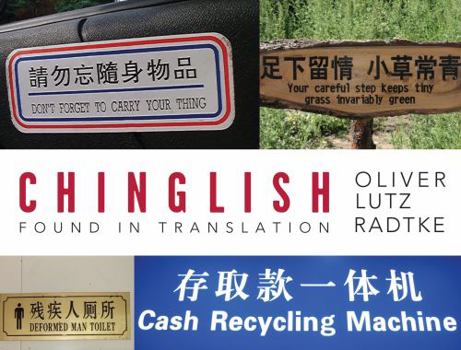Chinglish: Found in Translation
Select Format
Select Condition 
Book Overview
Chinglish offers a humorous and insightful look at misuses of the English language in Chinese street signs, products, and advertising. A long-standing favorite of English speaking tourists and visitors, Chinglish is now quickly becoming a culture relic: in preparation for the 2008 Olympic Games in Beijing, the Chinese government was determined to wipe out incorrect English usage.
Format:Paperback
Language:English
ISBN:1423603354
ISBN13:9781423603351
Release Date:August 2007
Publisher:Gibbs Smith
Length:112 Pages
Weight:0.60 lbs.
Dimensions:0.5" x 7.3" x 5.6"
Age Range:16 years and up
Customer Reviews
5 ratings
Entertaining, Funny....
Published by Thriftbooks.com User , 15 years ago
This is a fun read for someone who enjoys Chinglish. I think it makes a good gift idea. Nice graphics, however usually you can find the same/similar material on websites and enjoy them just the same.
Both funny and philosophical
Published by Thriftbooks.com User , 16 years ago
I do not speak or read Chinese; I am impressed by anyone Chinese who tries to communicate in English. That said, I chuckled at the unintentionally humorous and mystifying English signage to be found in China. This small book presents some excellent examples of Chinglish. The book manages to be gently funny and also provides examples that raise deep philosophical issues about English, China and life. This book will make you both chuckle and ponder.
Great for a laugh!
Published by Thriftbooks.com User , 16 years ago
Some of the items in this book have to be seen to be believed! This is one of those ones you end up laughing out loud at while in line to pay for it.
So funny!
Published by Thriftbooks.com User , 17 years ago
Reading the little gems on this book made me laugh so hard, tears started coming out of my eyes. It is even funnier if you can know Chinese, like the menu item "Black Pepper Cowboy Bones".... the item actually is Cross-cut Beef Spareribs in Black Pepper Sauce. Sorry, I just can't stop laughing!!
Save the signs
Published by Thriftbooks.com User , 17 years ago
If you have ever visited China, you may have come across a sign that says "Little grass has life" or similiar bewildering phrases on signboards. Here's now a fine collection of many other such instances that have been documented by author Oliver Lutz Radtke. "Chinglish" provides us with a solid insight into the everyday use of the Chinese language on bilingual signs and boards. The book demonstrates a unique way of expressing ideas, intentions and interests. Pictures of the Chinese originals in it's entirety are displayed and backed up by English elaborations of the intended meaning. At first glance, the book probably strikes the reader as one that heightens the perceived idea that China's "lingiustic misadventures" are a result of incompetence and a lack of knowledge. This impression is quickly banished as it transforms into a new point of view: A very creative method of expressing circumstances, requests and prohibitions emerge - completely different from the European way of phrasing caution or providing warning for instructions like "stay off the grass." These bilingual signs and boards (even with all the "mistakes" in them) documents a Chinese attempt to reach an international audience. So for me "Chinglish" isn't primarily a local linguistic phenomenon but a sociological one: It's a way of thinking about possible communication settings. Respectfully, the author analyzes several models of sociological and physiological explanations and his deep insight into Chinese mentality and language is inherent.






